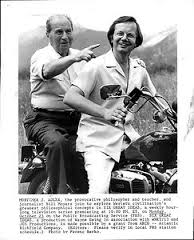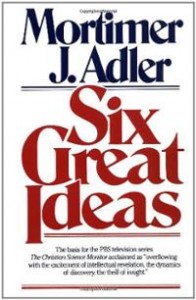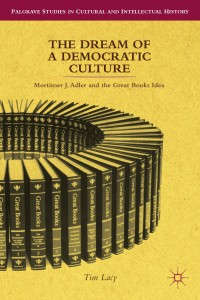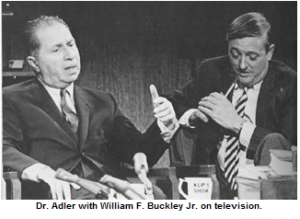The 1940s and 1950s have been called by some the “Golden Age of Television.” The early 1960s, on the other hand, was when Newton Minow designated some aspects of the medium a “vast wasteland.” The recent rise of excellent cable miniseries and programming, since the late 1990s, has prompted critics to argue we are living in a “New Golden Age” of television. If these designations are true, what do we call the period from the 1970s through the early 1990s? I’ve always thought of this as the “Golden Age of the Sitcom.” I’m sure this directly related to the fact that I was introduced, as an adolescent, to many awful-but-entertaining comedies and dramas in the late 1970s and 1980s. Of course there existed other interesting programming, and the rise of cable and public television occurred in this period, but it seems that this time period was dominated by situational comedies.
Whatever the case, it’s somewhat ironic, to me anyway, that Mortimer Adler’s brief rise as a recognizable television figure occurred in the heyday of non-serious programming—when viewers seemed to turn on the TV for emotional purgation rather than intellectual stimulation. Below is a selection, sliced from my chapter on the 1980s during the final round of manuscript editing, that deals with Adler’s peak period on television. Since his media coverage occurred in relation to the promotion of his philosophical books, this seemed less of a priority in the manuscript than Adler’s 1980s work on the Paideia Project and for Britannica. That said, this piece helps explain Adler’s resurgence as a public figure in the early 1980s. The selection demonstrates his connections to two prominent intellectuals and media figures, as well as the respect both gave him. This selection builds on another cutting-room-floor piece wherein I discussed Adler’s philosophy of television.
——————————————————————————–
In April 1981, Bill Moyers agreed to film a series on Mortimer J. Adler’s Six Great Ideas (published in 1981 also). The Atlantic Richfield Company (ARCO) underwrote the project with a $1,000,000 budget: one half for production and the other for a national advertising campaign.

Adler and Moyers in 1982. This is the thumbnail of a photo for sale (or once for sale) on ebay. I like how it dovetails with last week’s post about Pirsig and the great books at the University of Chicago
Hopes were high. Moyers was quoted in the series’ press release as saying that “PBS should precede each broadcast with a cautionary message: ‘Warning: The program you are about to watch contains material that may be hazardous to your opinions.” Moyers added: “I have to be frank about the limitations of this series. You will not learn how to bake bread, build bridges, make a killing on the market, or vote on Election Day. But you may realize that thinking is fun, ideas are exciting, and Mortimer Adler should be turned loose in every school in America.” [2]
Adler wrote Albert Litewka, President of Macmillan’s General Books Division, in July 1981 that Macmillan ought to take full advantage the coming series. In that letter Adler noted that Moyers had told him that “these will be the best six programs he has ever turned out,” and that Moyers “paid me the compliment . . . that he had never devoted so much time, energy, and film-stock to anyone else.” Adler reminded Litewka that Six Great Ideas would be mentioned numerous times in the series and “physically manifest in many of the shots.” Because of this Adler suggested that, based on sales of Aristotle for Everybody from the prior Moyers series, Macmillan ought to print 150 to 200,000 copies of Six Great Ideas in preparation. This further demonstrates how Adler, in Clifton Fadiman’s words, made capitalism “his junior partner.” [3]
 Media discussions about the series reveal tensions in the overall project to democratize culture through preaching the great ideas and the great books. Arthur Unger interviewed Adler about the series for a November 1982 review in the Christian Science Monitor. One particular question and answer sequence, as relayed by Unger, gets at the heart of the matter:
Media discussions about the series reveal tensions in the overall project to democratize culture through preaching the great ideas and the great books. Arthur Unger interviewed Adler about the series for a November 1982 review in the Christian Science Monitor. One particular question and answer sequence, as relayed by Unger, gets at the heart of the matter:
How does Mr. Adler react to the criticism that a series like ‘Great Ideas’ is elitist, that it is aimed at a select few?
His irritation makes itself evident in his knit brow, the sudden stern focusing on the interviewer of the constantly dancing eyes. ‘I think this series is exactly the kind of thing which should be on public television. There is a very sizable segment of the population out there that deeply appreciates it. When we did our Aristotle program last year, we got 10,000 letters in two weeks. Commercial TV, newspaper editors, and most lecturers underestimate the intelligence of the American people. They talk down to the audience. And the audience gets weary of being fed pap. I’ve always found that you must cast just a little bit above people’s heads. Not so far that they can’t reach it, but far enough so that they have something to reach for.’[4]
Here we are confronted with an apparent contradiction in Adler’s goals, especially related to his stated desire to reach a popular audience. What does one make of Adler’s perception that one must give audiences something over their heads, “to reach for,” in relation to his effort to create an accessible, eminently reachable common-sense public philosophy based on Aristotle’s thought? Or is this tension between providing access and creating an aspiration for excellence simply inherent in education in a democratic culture? Are feelings about a popularizer’s failures or successes simply a function of class perspective? What is too high or low for “reaching”?
During the same month of that same year (April 1981), Adler also discussed Six Great Ideas on William F. Buckley’s Firing Line program. But rather than focus strictly on the ideas in the book, Buckley connected Adler’s thought to political philosophy and, indirectly, the Culture Wars. Adler obliged—despite Buckley’s likely disagreement with Adler’s final point, given here:
Adler with Buckley, date unknown[/caption]Other Firing Line episodes took a similar turn toward political philosophy and ideology. They also resulted in a few tug-of-wars about politics with Buckley. While the content of this particular remark in relation to Six Great Ideas represented an effort to raise the caliber of political discussion, Adler’s allowance for political terminology, given the setting, also allowed for the insertion of hints of ideology into his already difficult project to democratize culture.In our society there are libertarians who think that liberty is the supreme value, and everyone should have as much as possible, without limit. There are egalitarians who [hold] the leveling doctrine of everyone should be equal, without any differences in degree at all. …The only correction of those two errors—libertarian error and the egalitarian error—is to see that justice is the sovereign idea. You can’t have too much justice. [5]
Buckley often used Adler’s books as platforms for cultural, educational, and intellectual commentary. For instance, in a 1980 appearance touting Adler’s 1980 book, How to Think About God, Buckley led Adler into a discussion of how philosophically corrupted secular academics will not address questions about God. Adler indulged, replying that “academics lapped up” arguments about the “death of God” in the 1960s and 1970s. In two 1985 episodes covering Adler’s Ten Philosophical Mistakes, Buckley lamented the errors of linguistic philosophy related to postmodernism or poststructuralism. Buckley also critiqued the Catholic Church for changing the wording of the Beatitudes from “blessed” to “happy.” Even divorce’s relationship to philosophy came up in a discussion with Adler.[6] Each episode would, at some point, include a sequence where Buckley referenced a politically charged cultural issue, with Adler responding by relating the issue to philosophy or the great books idea. Given Adler’s philosophical thoughts on the uses of television, the exchanges with Buckley were probably at least entertaining for Adler—if not exactly educational or informative. – TL
——————————————————————————–
Notes
[1] University of Chicago Special Collections (UCSC), Mortimer J. Adler Papers (MJAP), Box, 130, folder: “Arrangements w/Moyer” (Moyer to Adler, 4/16/1981); Box 116, folder: “Haywood/…Sales/PR” (Adler to Albert Litewka, 7/15/1981) and Box 109, loose press release, “Six Great Ideas with Mortimer Adler and Bill Moyers”; Walter Goodman, “TV: Mortimer Adler Views ‘Six Great Ideas,” New York Times, 1 November 1982, p. C18; Mortimer Adler, A Second Look in the Rearview Mirror (New York: Macmillan, 1992), 197.
[2] UCSC/MJAP, Box 109, loose press release, “Six Great Ideas with Mortimer Adler and Bill Moyers” (October 1982).
[3] UCSC/MJAP, Box 116, folder: “Haywood/…Sales/PR” (Adler to Albert Litewka, 7/15/1981); Adler, Second Look, 57. Fadiman said this in a 1965 speech to Britannica sales managers on the Great Books. Part of that speech is recounted at the end of chapter three in my book.
[4] Arthur Unger, “Mortimer Adler brings some ‘Great Ideas’ to public TV,” The Christian Science Monitor, November 12, 1982, p. 19.
[5] Stanford University, Hoover Institution Archives, Firing Line Television Program Collection (hereafter SUHIA/FLTPC), Finding Aid, excerpts from program.
[6] SUHIA/FLTPC, S0408 (broadcast 5/24/1980), S0645 (broadcast 5/24/1985), S0646 (broadcast 5/31/1985). During Adler’s first appearance on Firing Line in 1970, Buckley called Adler a “little bit paternalistic” for Adler’s suggestion, in the tradition of Plato and John F. Kennedy’s Peace Corps, that “compulsory public service” ought to be required of all young people [Programs 193 (taped 3/13/1970)]. Other examples of a conservative slant exist, but discussion of them will occur during in explorations of Paideia and Allan Bloom’s Closing of the American Mind.



3 Thoughts on this Post
S-USIH Comment Policy
We ask that those who participate in the discussions generated in the Comments section do so with the same decorum as they would in any other academic setting or context. Since the USIH bloggers write under our real names, we would prefer that our commenters also identify themselves by their real name. As our primary goal is to stimulate and engage in fruitful and productive discussion, ad hominem attacks (personal or professional), unnecessary insults, and/or mean-spiritedness have no place in the USIH Blog’s Comments section. Therefore, we reserve the right to remove any comments that contain any of the above and/or are not intended to further the discussion of the topic of the post. We welcome suggestions for corrections to any of our posts. As the official blog of the Society of US Intellectual History, we hope to foster a diverse community of scholars and readers who engage with one another in discussions of US intellectual history, broadly understood.
Tim–Nice piece. Buckley published a book called On the Firing Line that has excerpts with prominent guests including Adler. At the back of the book there is a list of the guests and when they appeared on the show.
Thanks Jason. I wasn’t aware of Buckley’s retrospective/indexing efforts. Nice. I could’ve used that about 3-4 years ago! – TL
There is a common view that material like Adler’s or even Mortimer’s on television is merely mediocre middlebrow junk of little value. It see,s to me that, Buckley’s or Adler’s conservatism, or safe caution aside, it surely wasn’t a bad think that Aristotle was even discussed on television. I’m a bit of a contrarian to Nancy Franklin, James Wolcott, and Lorrie Moore in that i think the 1970s through early 80s were the real last golden age of television and the current shows are incredibly overrated.